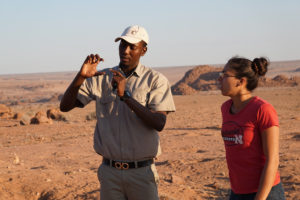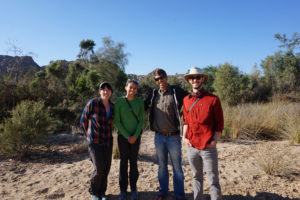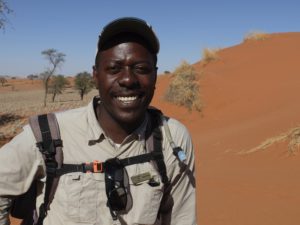Nature guiding advice from the pros
An interpretive nature guide is many things:
- A searcher: identifying an eagle from just the silhouette
- A protector: watching for thorny bushes and crumbling rocks
- A friend: sharing stories and easing the group
- A connector: bringing the whole picture together
I recently took a trip to Namibia to learn as much as I could about ecotourism from the experts. At each location visited, I absorbed the experience from the perspective of a tourist — and then asked these master guides what makes a good guide.
 John, Sorris Sorris
John, Sorris Sorris
Sorris Sorris is a recently opened ecotourism lodge in Damaraland run by the local community. It is the home of the desert-adapted elephant. And John Green Gabriel is the nature guide tasked with finding them.
John was trained at the National Academy for Tourism and Hospitality in Namibia and, as a new guide, he knows he’s still growing his craft. During his downtime, he likes to explore the area, hike, and climb on the seemingly random piles of rock dropped onto the flat plain.
His advice to guides? Patience. You won’t find every animal every time. (The elephants had vanished from the area a week before our arrival). You can’t rush a true nature experience. When we hiked up to an overlook to watch the sunrise, John let the conversation fade. Silence and awe accompanied the sunrise, making for an experience full of wonder.
 Dayne, Batis Birding
Dayne, Batis Birding
A different ecotourism model, Batis Birding takes customers on day trips to sites around the seaside city of Swakopmund. Our guide was Dayne Braine, son of Namibian naturalist and ornithologist Steve Braine, who owns the company. Dayne, along with brother and fellow guide Sean, grew up in the wilderness of the Hobatere wildlife concession, establishing his environmentalism at an early age.
His advice to guides: Care about the environment. Teach others about the environment. Dayne purposefully does not engage in activities like dune bashing (driving the safari jeep aggressively through dunes ruins the landscape and can injure hiding animals), or digging up certain spiders that expend a great deal of energy to dig burrows. Instead he teaches his passengers about these issues. He hopes that as understanding grows, so will the respect for the land. For Dayne, guiding is not about money. It’s about conservation.
“Money is nice to make,” he said, “but it’s not how you save the world.”
 Sebastiaan, Tok Tokkie Trails
Sebastiaan, Tok Tokkie Trails
Tok Tokkie Trails is yet another version of Namibian ecotourism. Participants hike into the Namibrand Nature Reserve and spend two nights under the stars. The guide for this adventure is Sebastiaan Kazimbo, who has been walking the trail with guests since 2009.
Sebastiaan strives to help his hikers see the wonder in the landscape. Early on, he cut a brown, dead-looking sprig of a bushman’s tea bush and sticks it in a half-full bottle of water. Hours later, as we pulled into the evening’s campsite, we checked the clipping and saw it had sprung back to life, full of green leaves. Later, on the dunes, he pulled a magnet across the sand, collecting the iron to spell out Namibia in the black metal.
His advice: “To be a guide, you need to love nature,” he said. “Your career should really start from the love of nature, and then you will love what you do.”
Meeting people from all over the world, he said, means guides must be able to judge their audience well. “It doesn’t get boring because even when people ask the same questions, you answer them in different ways because they’re different people.”
Guides can inspire. Great guides can transform people into stewards of the land — people who will forever be protective of a place that transformed their lives. For more information about guide training and other resources, check out the National Association for Interpretation.
